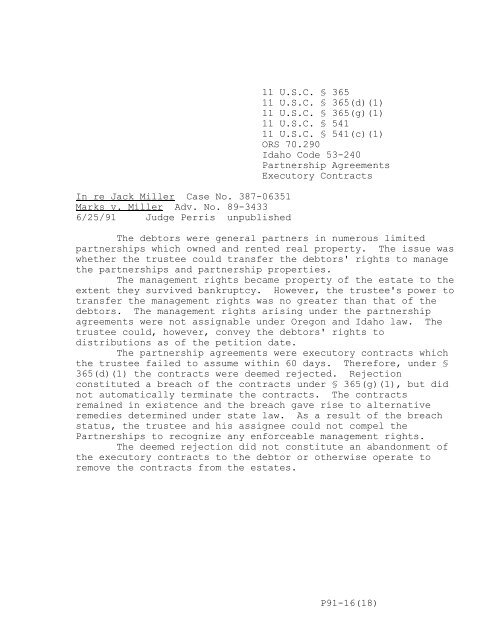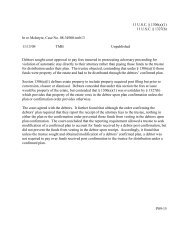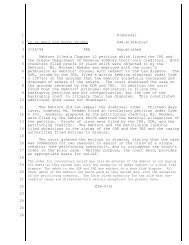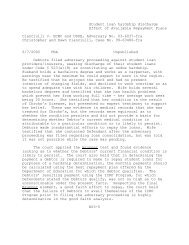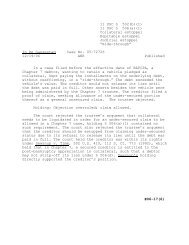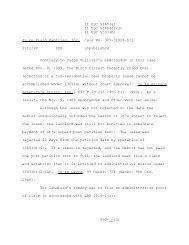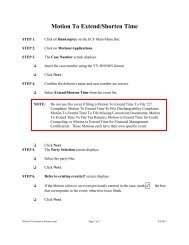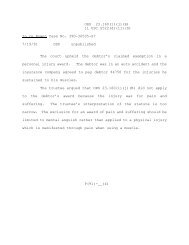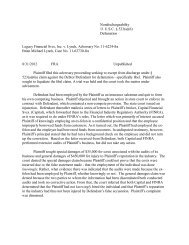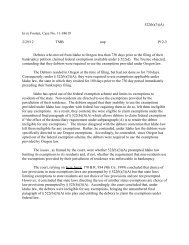11 USC § 365 11 USC § 365(d)(1) - District of Oregon
11 USC § 365 11 USC § 365(d)(1) - District of Oregon
11 USC § 365 11 USC § 365(d)(1) - District of Oregon
You also want an ePaper? Increase the reach of your titles
YUMPU automatically turns print PDFs into web optimized ePapers that Google loves.
In re Jack Miller Case No. 387-06351<br />
Marks v. Miller Adv. No. 89-3433<br />
6/25/91 Judge Perris unpublished<br />
<strong>11</strong> U.S.C. <strong>§</strong> <strong>365</strong><br />
<strong>11</strong> U.S.C. <strong>§</strong> <strong>365</strong>(d)(1)<br />
<strong>11</strong> U.S.C. <strong>§</strong> <strong>365</strong>(g)(1)<br />
<strong>11</strong> U.S.C. <strong>§</strong> 541<br />
<strong>11</strong> U.S.C. <strong>§</strong> 541(c)(1)<br />
ORS 70.290<br />
Idaho Code 53-240<br />
Partnership Agreements<br />
Executory Contracts<br />
The debtors were general partners in numerous limited<br />
partnerships which owned and rented real property. The issue was<br />
whether the trustee could transfer the debtors' rights to manage<br />
the partnerships and partnership properties.<br />
The management rights became property <strong>of</strong> the estate to the<br />
extent they survived bankruptcy. However, the trustee's power to<br />
transfer the management rights was no greater than that <strong>of</strong> the<br />
debtors. The management rights arising under the partnership<br />
agreements were not assignable under <strong>Oregon</strong> and Idaho law. The<br />
trustee could, however, convey the debtors' rights to<br />
distributions as <strong>of</strong> the petition date.<br />
The partnership agreements were executory contracts which<br />
the trustee failed to assume within 60 days. Therefore, under <strong>§</strong><br />
<strong>365</strong>(d)(1) the contracts were deemed rejected. Rejection<br />
constituted a breach <strong>of</strong> the contracts under <strong>§</strong> <strong>365</strong>(g)(1), but did<br />
not automatically terminate the contracts. The contracts<br />
remained in existence and the breach gave rise to alternative<br />
remedies determined under state law. As a result <strong>of</strong> the breach<br />
status, the trustee and his assignee could not compel the<br />
Partnerships to recognize any enforceable management rights.<br />
The deemed rejection did not constitute an abandonment <strong>of</strong><br />
the executory contracts to the debtor or otherwise operate to<br />
remove the contracts from the estates.<br />
P91-16(18)
UNITED STATES BANKRUPTCY COURT<br />
FOR THE DISTRICT OF OREGON<br />
In Re: ) Case No. 387-06351-P7<br />
)<br />
JACK M. MILLER, )<br />
)<br />
Debtor. )<br />
________________________________)<br />
)<br />
THOMAS G. MARKS, as Trustee <strong>of</strong> ) Adversary No. 89-3433<br />
the bankruptcy estates <strong>of</strong> ) (Consolidated)<br />
Rockwood Development )<br />
Corporation, Mark E. Miller, )<br />
and Jack M. Miller, )<br />
)<br />
Plaintiff, )<br />
)<br />
v. ) MEMORANDUM OPINION<br />
)<br />
JACK M. MILLER, THOMAS PAULUS, )<br />
BRENTWOOD LAND OREG. LTD., an )<br />
<strong>Oregon</strong> limited partnership, )<br />
BRENTWOOD OFFICE PARK OREG. )<br />
LTD., an <strong>Oregon</strong> limited )<br />
partnership, BRIARWOOD MANOR )<br />
OREG. LTD., an <strong>Oregon</strong> limited )<br />
partnership, COUNTRYWOOD MANOR )<br />
OREG. LTD., an <strong>Oregon</strong> limited )<br />
partnership, GARFIELD LAND )<br />
OREG. LTD., an <strong>Oregon</strong> limited )<br />
partnership, GARFIELD OFFICE )<br />
BUILDING OREG. LTD., an <strong>Oregon</strong> )<br />
limited partnership, GLENWOOD )<br />
MANOR OREG. LTD., an <strong>Oregon</strong> )
limited partnership, HOPE )<br />
PONDEROSA OREG. LTD., an )<br />
<strong>Oregon</strong> limited partnership, )<br />
IDYLWOOD MANOR OREG. LTD., an )<br />
<strong>Oregon</strong> limited partnership, )<br />
JAMES COURT ASSOCIATES, an )<br />
Idaho limited partnership, )<br />
MILLWOOD MANOR OREG. LTD., an )<br />
<strong>Oregon</strong> limited partnership, )<br />
NORTHWEST APARTMENTS OREG. )<br />
LTD., an <strong>Oregon</strong> limited )<br />
partnership, NYSSA MANOR OREG. )<br />
LTD., an <strong>Oregon</strong> limited )<br />
partnership, ONTARIO MANOR )<br />
OREG. LTD., an <strong>Oregon</strong> limited )<br />
partnership, ONTARIO MANOR )<br />
OREG. LTD. II, an <strong>Oregon</strong> )<br />
limited partnership, PARKSIDE )<br />
VILLAGE OREG. LTD., an <strong>Oregon</strong> )<br />
limited partnership, POST )<br />
OFFICE BUILDINGS OREG. LTD., )<br />
an <strong>Oregon</strong> limited partnership, )<br />
ROCKWOOD ALPINE OREG. LTD., an )<br />
<strong>Oregon</strong> limited partnership, )<br />
ROCKWOOD LAUREL PARK OREG. )<br />
LTD., an <strong>Oregon</strong> limited )<br />
partnership, ROCKWOOD )<br />
HAWAII OREG. LTD., an <strong>Oregon</strong> )<br />
limited partnership, ROCKWOOD )<br />
PROPERTIES IDAHO OREG. LTD., )<br />
an <strong>Oregon</strong> limited partnership, )<br />
ROCKWOOD PROPERTIES I OREG. )<br />
LTD., an <strong>Oregon</strong> limited )<br />
partnership, GREENWOOD MANOR )<br />
OREG. LTD., an <strong>Oregon</strong> limited )<br />
partnership, ROCKWOOD CALDWELL )<br />
OREG. LTD., an <strong>Oregon</strong> limited )<br />
partnership, OCHOCO MANOR )<br />
OREG., LTD., an <strong>Oregon</strong> limited )<br />
partnership, PINEWOOD MANOR )<br />
OREG. LTD., an <strong>Oregon</strong> limited )<br />
partnership, SURFWOOD MANOR )<br />
OREG. LTD., an <strong>Oregon</strong> limited )<br />
partnership, MILLCREEK OFFICE )<br />
PARK OREG. LTD., a dissolved )<br />
<strong>Oregon</strong> limited partnership, )<br />
BAYWOOD MANOR CONDOMINIUMS )<br />
OREG. LTD., a dissolved )<br />
limited partnership, )
CHERRYWOOD MANOR OREG. LTD., a )<br />
dissolved <strong>Oregon</strong> limited )<br />
partnership, and RIVERGROVE )<br />
OFFICE PARK OREG. LTD., a )<br />
dissolved <strong>Oregon</strong> limited )<br />
partnership, )<br />
)<br />
Defendants. )<br />
________________________________)<br />
)<br />
In Re: )<br />
)<br />
ROCKWOOD DEVELOPMENT )<br />
CORPORATION, )<br />
)<br />
Debtor. )<br />
________________________________)<br />
)<br />
THOMAS G. MARKS, as Trustee <strong>of</strong> )<br />
the bankruptcy estates <strong>of</strong> )<br />
Rockwood Development )<br />
Corporation, Mark E. Miller, )<br />
and Jack M. Miller, )<br />
)<br />
Plaintiff, )<br />
)<br />
v. )<br />
)<br />
ROCKWOOD DEVELOPMENT )<br />
CORPORATION, an <strong>Oregon</strong> )<br />
corporation, MARK E. MILLER, )<br />
JACK M. MILLER, and )<br />
THOMAS PAULUS, )<br />
)<br />
Defendants. )<br />
________________________________)<br />
)<br />
In Re: )<br />
)<br />
MARK E. MILLER, )<br />
)<br />
Debtor. )<br />
________________________________)<br />
)<br />
THOMAS G. MARKS, as Trustee <strong>of</strong> )<br />
the bankruptcy estates <strong>of</strong> )<br />
Rockwood Development )<br />
Corporation, Mark E. Miller, )<br />
and Jack M. Miller, )<br />
)<br />
Case No. 387-04330-P7<br />
(formerly Adv. Pro. No.<br />
89-3432, now consolidated)<br />
Case No. 387-04494-P7<br />
(formerly Adv. Pro. No.<br />
89-3431, now consolidated)
v.<br />
Plaintiffs,<br />
ROCKWOOD DEVELOPMENT<br />
CORPORATION, an <strong>Oregon</strong><br />
corporation, MARK E. MILLER,<br />
JACK M. MILLER, and THOMAS<br />
PAULUS,<br />
Defendants.<br />
________________________________)<br />
)<br />
In Re: ) Case No. 387-06351-P<strong>11</strong><br />
)<br />
JACK MILLER, )<br />
)<br />
Debtor. )<br />
________________________________)<br />
)<br />
WILSHIRE INVESTMENTS ) (formerly Adv. Pro. No.<br />
CORPORATION, a California<br />
corporation, as general<br />
partner <strong>of</strong> BURNWOOD HOUSING<br />
LIMITED PARTNERSHIP;<br />
CLEARWATER HOUSING LIMITED<br />
PARTNERSHIP; FIRWOOD<br />
PROPERTIES LTD.; GREENWOOD<br />
HOUSING LIMITED PARTNERSHIP;<br />
OCHOCO HOUSING LIMITED<br />
PARTNERSHIP; PINEWOOD<br />
INVESTMENT LTD.; SURFWOOD<br />
HOUSING LIMITED PARTNERSHIP,<br />
all <strong>Oregon</strong> limited<br />
partnerships, and INDIANA<br />
MANOR LIMITED PARTNERSHIP,<br />
an Idaho limited partnership,<br />
v.<br />
Plaintiffs,<br />
JACK MILLER and THOMAS G.<br />
MARKS as Trustee for<br />
ROCKWOOD DEVELOPMENT<br />
CORPORATION,<br />
Defendants.<br />
)<br />
)<br />
)<br />
)<br />
)<br />
)<br />
)<br />
)<br />
)<br />
)<br />
)<br />
) 88-0230, now consolidated)<br />
)<br />
)<br />
)<br />
)<br />
)<br />
)<br />
)<br />
)<br />
)<br />
)<br />
)<br />
)<br />
)<br />
)<br />
)<br />
)<br />
)<br />
)<br />
)<br />
)<br />
)<br />
)<br />
)<br />
)<br />
)<br />
)<br />
The central controversy in these consolidated adversary
proceedings is whether any <strong>of</strong> the debtors' rights to manage<br />
limited partnerships were transferred by the trustee. Resolution<br />
<strong>of</strong> that question involves a determination <strong>of</strong> whether such rights<br />
are assignable by a bankruptcy trustee and whether such rights<br />
are part <strong>of</strong> an executory contract.<br />
FACTS<br />
The debtors are Jack Miller, Rockwood Development Corp.<br />
and Mark Miller. At least one <strong>of</strong> the debtors was a general<br />
partner in numerous limited partnerships (the Partnerships).<br />
Each Partnership owns and operates rental property. Each<br />
Partnership Agreement grants the general partner the right to<br />
manage the Partnership and to appoint a manager for the property<br />
owned by the Partnership.<br />
In June, 1987 Mark Miller filed with the <strong>Oregon</strong><br />
Corporation Commission an amendment purporting to change the<br />
Partnership Agreement provisions regarding the effect <strong>of</strong> a<br />
general partner's bankruptcy (the "Bankruptcy Amendments").<br />
Before the purported amendment, the Partnership Agreements<br />
provided that the bankruptcy <strong>of</strong> a general partner constituted an<br />
event <strong>of</strong> withdrawal <strong>of</strong> the general partner from the Partnership.<br />
The Partnership Agreements provided that upon such an event, the<br />
Partnership could continue upon performance <strong>of</strong> certain<br />
conditions. The Bankruptcy Amendments purported to change those<br />
provisions so that the bankruptcy <strong>of</strong> a general partner would not<br />
be deemed an event <strong>of</strong> withdrawal and would not cause Partnership
dissolution.<br />
In August, 1987 Rockwood and Mark Miller filed voluntary<br />
petitions under Chapter 7 <strong>of</strong> the Bankruptcy Code (<strong>11</strong> U.S.C.). In<br />
November, 1987 creditors filed an involuntary Chapter 7 petition<br />
against Jack Miller. Jack Miller filed an Answer consenting to<br />
relief under Chapter <strong>11</strong>, and an order for relief under Chapter <strong>11</strong><br />
was entered on December 23, 1987. In March, 1989 his case was<br />
converted back to Chapter 7.<br />
In the spring <strong>of</strong> 1989, Jack Miller, purporting to act as<br />
general partner, attempted to amend some <strong>of</strong> the Partnership<br />
Agreements to add a new general partner, Thomas Paulus. In June,<br />
1989 the court approved the sale <strong>of</strong> the estates' assets to Lee<br />
Pacific. The trustee did not seek nor obtain the limited<br />
partners' consent to the transfer to Lee Pacific prior to the<br />
sale. At trial the parties announced the settlement <strong>of</strong> the<br />
adversary proceeding filed by Wilshire Development Corp. against<br />
Jack Miller. Therefore, Wilshire Development Corp. did not<br />
participate in the trial. Similarly, there is a pending<br />
settlement between the Trustee and the following Partnerships<br />
represented by Mr. Padrick: Brentwood Land Oreg. Ltd., Ontario<br />
Manor Oreg. Ltd., Rockwood Properties I Oreg. Ltd., Rockwood<br />
Caldwell Oreg. Led., and Pinewood Manor Oreg. Ltd. Those<br />
Partnerships also did not participate in the trial.<br />
I previously entered a judgment by default against Mark<br />
Miller and Rockwood Development Corp. The disposition <strong>of</strong> the
issues as to those defendants is based upon the judgment <strong>of</strong><br />
default. However, as to the parties which appeared, issues<br />
concerning the transfers <strong>of</strong> Mark Miller's and Rockwood<br />
Development Corp.'s partnership interests and management rights<br />
are controlled by this ruling.<br />
By letter ruling dated December 7, 1990 on motions for<br />
summary judgment filed by the trustee, Jack Miller and Wilshire,<br />
I held that, to the extent they survived bankruptcy, Jack<br />
Miller's general partner interests, including his rights to<br />
manage the Partnerships and to manage or appoint a manager for<br />
Partnerships' properties, were property <strong>of</strong> the estate. For the<br />
reasons set forth in that ruling, the same is true for the<br />
interests <strong>of</strong> Mark Miller and Rockwood Development Corp.<br />
The ultimate question in this case is whether any<br />
management rights or rights to select management were effectively<br />
transferred by the trustee to Lee Pacific. As the sale to Lee<br />
Pacific was conditioned upon this court's retaining jurisdiction<br />
over that issue, this is a core proceeding under 28 U.S.C. <strong>§</strong><br />
157(b)(2)(A), (N) and (O). See Pretrial Order lodged March 18,<br />
1991.<br />
DISCUSSION<br />
I. THE MANAGEMENT RIGHTS CONTAINED IN THE PARTNERSHIP<br />
AGREEMENTS WERE NOT ASSIGNABLE BY THE TRUSTEE<br />
The commencement <strong>of</strong> the bankruptcy cases transferred the<br />
debtors' interests under the Partnership Agreements to the estate
under <strong>§</strong> 541 1 . However, the provision <strong>of</strong> <strong>§</strong>541(c)(1), which permit<br />
the transfer <strong>of</strong> property to the estate despite restrictions on<br />
transfer, do not invalidate such restrictions for all purposes.<br />
Rather, that particular provision is intended to eliminate<br />
barriers to the transfer <strong>of</strong> property to the estate and nothing<br />
more. In re Farmers Markets, Inc., 792 F.2d 1400, 1402 (9th Cir.<br />
1986). The trustee takes the rights under the Partnership<br />
Agreements subject to the same restrictions on transfer<br />
applicable to the debtor. The nature and extent <strong>of</strong> the Trustee's<br />
rights in the agreements rise no higher than those <strong>of</strong> the Debtor,<br />
unless the restrictions are inconsistent with federal bankruptcy<br />
law. In re Baquet, 61 B.R. 495, 499 (Bankr. D. Mont. 1986).<br />
The essence <strong>of</strong> a limited partnership is a voluntary<br />
association between an investor or group <strong>of</strong> investors (the<br />
limited partners) and the investment manager (the general<br />
partner). The partnership depends upon the honesty, integrity<br />
and management skills <strong>of</strong> the general partner. At least one court<br />
has characterized the relationship as akin to a marriage. In re<br />
Sovereign Group, 88 B.R. 325, 329 (Bankr. D. Colo. 1988).<br />
Because <strong>of</strong> the unique nature <strong>of</strong> the relationship, the court<br />
should not be able to force a third party into the relationship<br />
in a manner inconsistent with the partnership agreement.<br />
The Partnership Agreements manifest the personal nature <strong>of</strong><br />
1<br />
Unless otherwise indicated, all statutory references are<br />
to title <strong>11</strong> <strong>of</strong> the United States Code.
the relationship through provisions which prevent the general<br />
partner from transferring his interest without the consent <strong>of</strong> the<br />
limited partners. State law also recognizes the personal nature<br />
<strong>of</strong> the relationship by defining the effect <strong>of</strong> an assignment <strong>of</strong> a<br />
partnership interest in a limited partnership as follows:<br />
An assignment <strong>of</strong> a partnership interest does not<br />
... entitle the assignee to become or to exercise<br />
any rights <strong>of</strong> a partner.... Except as provided in<br />
the partnership agreement, a partner ceases to be a<br />
partner upon assignment <strong>of</strong> all the partner's<br />
partnership interest. O.R.S. 70.290.<br />
In the instant case, under both <strong>Oregon</strong> and Idaho law 2 ,<br />
unless the Partnership Agreements provide otherwise, the<br />
assignment <strong>of</strong> an interest in a limited partnership does not<br />
entitle the assignee to become or to exercise any rights <strong>of</strong> a<br />
partner. ORS 70.290; I.C. 53-240. The Partnership Agreements do<br />
not provide otherwise. Nor did the trustee seek or obtain the<br />
consent <strong>of</strong> the limited partners prior to the transfer to Lee<br />
Pacific. Accordingly, I find that the transfer by the trustee to<br />
Lee Pacific did not convey any management rights under applicable<br />
state law. 3 The only right effectively conveyed under state law<br />
was the right to receive, to the extent assigned, the<br />
2<br />
Most <strong>of</strong> the partnerships were organized under the laws <strong>of</strong><br />
the state <strong>of</strong> <strong>Oregon</strong>. However, at least one <strong>of</strong> the Partnerships,<br />
James Court Associates, was organized under the laws <strong>of</strong> the state<br />
<strong>of</strong> Idaho. Accordingly, reference to state law requires inquiry<br />
into both <strong>Oregon</strong> and Idaho law. <br />
3<br />
I do not address the effect that any post-transfer acts<br />
<strong>of</strong> the partners or partnership may have had upon who may exercise<br />
management rights because the issues before the court can be<br />
resolved without determining the effects <strong>of</strong> such acts.
distribution to which the assignor would be entitled as <strong>of</strong> the<br />
petition date. ORS 70.290; I.C. 53.240. The management rights<br />
were personal and not assignable.<br />
The trustee apparently contends that policy reasons<br />
require that the court override any applicable state law<br />
restrictions on transferability. In particular, the trustee<br />
suggests that upholding the restriction on assignability would<br />
result in the termination <strong>of</strong> the Partnerships, with adverse tax<br />
consequences to the partners and no benefit to the estate.<br />
While it is not a foregone conclusion that the<br />
Partnerships would be terminated if the contracts were not<br />
assignable, 4 that issue is <strong>of</strong> no relevance to the question <strong>of</strong><br />
whether termination <strong>of</strong> the Partnerships would be inconsistent<br />
with federal bankruptcy law 5 . In fact, in the instant case<br />
termination would have no impact upon the administration <strong>of</strong> these<br />
estates, as the estates' interests in the Partnerships have<br />
already been sold.<br />
The trustee also argues that management rights under the<br />
Partnership Agreements constitute a species <strong>of</strong> "economic rights,"<br />
and apparently concludes that all "economic rights" are freely<br />
4<br />
See, e.g. O.R.S. 70.290 ("An assignment <strong>of</strong> a partnership<br />
interest does not dissolve a limited partnership ...."); In re<br />
Todd, <strong>11</strong>8 B.R. 432, 435 (9th Cir. BAP 1989). <br />
5<br />
The discussion <strong>of</strong> policy issues by the court in In re<br />
Cardinal Industries, Inc., <strong>11</strong>6 B.R. at 981, is not helpful in<br />
resolving this case. Cardinal involved whether management rights<br />
survived in a chapter <strong>11</strong> where the debtor remained in possession. <br />
The instant case involves whether a Chapter 7 trustee can<br />
transfer those rights to a third party.
assignable in bankruptcy. I disagree. To illustrate the<br />
incongruity <strong>of</strong> that argument, one need only to apply it to<br />
another contract containing "economic rights" - Michelangelo's<br />
Sistine Chapel contract. I doubt that Michelangelo's bankruptcy<br />
trustee would have been able to assign the Sistine contract to<br />
the party <strong>of</strong> his choice simply because the contract conferred the<br />
economic right to payment upon completion <strong>of</strong> the job.<br />
II. THE PARTNERSHIP AGREEMENTS WERE UNASSUMED EXECUTORY<br />
CONTRACTS<br />
Even if all rights <strong>of</strong> the general partner were freely<br />
assignable by the trustee, his failure to assume the Partnership<br />
Agreements prevents the transfer <strong>of</strong> any management rights under<br />
those contracts.<br />
A. The Partnership Agreements Were Executory Contracts.<br />
The source <strong>of</strong> all management rights at issue in this case<br />
are the Partnership Agreements. The debtors' rights under the<br />
Partnership Agreements are contractual. In re Sovereign Group,<br />
88 B.R. at 329; In re Harms, 10 B.R. 817 (Bankr. D. Colo. 1981);<br />
see In re Sigel, 923 F.2d 142 (9th Cir. 1991) (joint venture<br />
agreement is executory contract).<br />
The Partnership Agreements are executory contracts for the<br />
purposes <strong>of</strong> <strong>§</strong> <strong>365</strong>. While numerous courts have found partnership<br />
agreements are executory contracts, most have not gone into<br />
great depth in their analysis <strong>of</strong> the question, possibly assuming<br />
that such a conclusion is obvious. See, e.g., In re Cardinal
Industries, Inc., <strong>11</strong>6 B.R. 964 (Bankr. S.D. Ohio 1990) (listing<br />
cases in which courts have held partnership agreements are<br />
executory contracts). A contract is executory if the obligations<br />
<strong>of</strong> both the debtor and the non-debtor party remain so far<br />
unperformed that the failure <strong>of</strong> either to complete performance<br />
would constitute a material breach excusing performance <strong>of</strong> the<br />
other. In re Texscan Corp., 107 B.R. 227 (9th Cir. BAP 1989).<br />
Where the debtor owes duties to more than one entity under<br />
a contract, the contract will be deemed executory if there are<br />
material unperformed obligations between the debtor and any other<br />
entity under the contract. In determining whether the<br />
Partnership Agreements are executory, the debtors' duties to the<br />
Partnership entities must be considered. The Partnership<br />
entities were bound to pay fees to the general partners under the<br />
Partnership Agreements, and it would therefore be anomalous to<br />
ignore the obligations running between the debtors and the<br />
Partnerships in determining the executory status <strong>of</strong> the<br />
contracts.<br />
In In re Wegner, 839 F.2d 533 (9th Cir. 1988), the court<br />
held that the duty to pay money on one side is a material<br />
obligation sufficient to render the contract executory where<br />
corresponding material obligations exist on the other side.<br />
Corresponding material obligations burdened the general partners.<br />
The Partnership Agreements charged the general partners with the<br />
duty to perform management services for the various Partnerships.
The contracts' purpose was an exchange <strong>of</strong> management services for<br />
fees, and the failure to either pay the fees or perform the<br />
services would constitute a material breach. Those unperformed<br />
duties between the Partnerships and the managing partners<br />
rendered the Partnership Agreements executory.<br />
In addition, the duties running between the limited<br />
partners and the general partners rendered the agreements<br />
executory. Each limited partner agreed to refrain from selling<br />
his or her interest except upon certain conditions. The limited<br />
partners also agreed to limit their participation in the<br />
management <strong>of</strong> the Partnerships' business. Such negative<br />
covenants, if material, will render a contract executory. See In<br />
re Select-A-Seat Corp., 625 F.2d 290 (9th Cir. 1980) (covenant to<br />
refrain from selling s<strong>of</strong>tware to third parties rendered agreement<br />
executory). In the instant case, the limited partner's<br />
obligations to refrain from participating in management were<br />
material. The covenants prevented limited partners from meddling<br />
in management and protected the autonomy <strong>of</strong> the general partner.<br />
It also served to protect the general partner from liability for<br />
the acts <strong>of</strong> the limited partner. If a limited partner or group<br />
<strong>of</strong> limited partners were to intervene and take control <strong>of</strong> the<br />
management <strong>of</strong> a Partnership, the general partner would be<br />
justified in suspending his management activities. The limited<br />
partners' promise to refrain from management is not, as urged by<br />
the trustee, de minimis. I therefore conclude that, even if the
mutual duties owed between the Partnerships and the debtors were<br />
insufficient to render the contracts executory, the duties<br />
flowing between the debtors and the limited partners were<br />
sufficient to make the Partnership Agreements executory.<br />
B. The Effect <strong>of</strong> the Failure to Assume The Partnership<br />
Agreements.<br />
The trustee did not assume any <strong>of</strong> the Partnership<br />
Agreements. Section <strong>365</strong>(d)(1) provides that in a case under<br />
Chapter 7, if the trustee does not assume an executory contract<br />
within 60 days after the order for relief, or such additional<br />
time as the court, within such 60 day period, fixes, then the<br />
contract is deemed rejected. Thus, all Partnership Agreements<br />
were deemed rejected.<br />
Section <strong>365</strong>(g)(1) provides the effect <strong>of</strong> rejection <strong>of</strong> an<br />
executory contract:<br />
Except as provided in subsections (h)(2) and (i)(2)<br />
[neither <strong>of</strong> which apply to the instant case], the<br />
rejection <strong>of</strong> an executory contract or unexpired<br />
lease <strong>of</strong> the debtor constitutes a breach <strong>of</strong> such<br />
contract or lease-<br />
(1) if such contract or lease has not<br />
been assumed under this section or under<br />
a plan confirmed under chapter 9, <strong>11</strong>, 12,<br />
or 13 <strong>of</strong> this title, immediately before<br />
the date <strong>of</strong> the filing <strong>of</strong> the petition<br />
.... (Emphasis added.)<br />
Therefore, under the plain language <strong>of</strong> the statute, the<br />
effect <strong>of</strong> rejection is defined by reference to the breach status.<br />
As explained in Westbrook, A Functional Analysis <strong>of</strong> Executory<br />
Contracts, 74 Minn. L. Rev. 227, 244 (1989),
[T]he trustee inherits from the pre-bankruptcy<br />
debtor a contract created by nonbankruptcy law.<br />
The statutory option to "assume or reject" means<br />
exactly what the Code says it means: the option to<br />
perform or breach the contract, the same option<br />
every contract party has under nonbankruptcy law.<br />
It follows that the trustee is prima facie in the<br />
same position as any nonbankruptcy contract party,<br />
except when specific bankruptcy principles and<br />
rules require a different result.<br />
Thus, a breach <strong>of</strong> contract does not automatically result<br />
in the contract's termination. 6 Instead, the contract remains<br />
6<br />
The trustee contends that under Sea Harvest v. Riviera<br />
Land Co., 868 F.2d 1077, 1080 (9th Cir. 1989), the effect <strong>of</strong><br />
rejection is always termination. In Sea Harvest, the Ninth<br />
Circuit Court <strong>of</strong> Appeals held that the rejection <strong>of</strong> a lease <strong>of</strong><br />
nonresidential real property under <strong>§</strong> <strong>365</strong> was the same as<br />
termination <strong>of</strong> the lease. In support <strong>of</strong> its ruling, the Sea<br />
Harvest court noted that <strong>§</strong> <strong>365</strong>(d)(4) required that upon<br />
rejection, the trustee immediately surrender the leased premises. <br />
The court stated that "surrender <strong>of</strong> property ... has the effect<br />
<strong>of</strong> terminating the enterprise that operates there." There is no<br />
analogous surrender provision in <strong>§</strong> <strong>365</strong> regarding contracts, and<br />
Sea Harvest is distinguishable on that basis. I believe Sea<br />
Harvest should be narrowly construed. A broad reading would be<br />
inconsistent with the express language <strong>of</strong> the Code defining the<br />
effect <strong>of</strong> rejection as a breach, as well as state law defining<br />
the consequences <strong>of</strong> a breach.<br />
The trustee argues that the final clause <strong>of</strong> <strong>§</strong> <strong>365</strong>(d) is<br />
not intended to treat leases differently from contracts, but<br />
merely makes explicit that termination <strong>of</strong> a lease requires<br />
surrender <strong>of</strong> the premises. He reasons that three subsections <strong>of</strong><br />
<strong>§</strong> <strong>365</strong> [(h), (i) and (n)] give the non-debtor party certain<br />
options which are inconsistent with termination, and therefore<br />
concludes that in all other cases the effect <strong>of</strong> rejection is<br />
termination.<br />
I disagree regarding the inference that should be drawn<br />
from the inclusion <strong>of</strong> those subsections. I believe that the<br />
subsections referred to by the trustee are intended as exceptions<br />
to the rule that state law defines the effect <strong>of</strong> a breach. The<br />
exceptions are intended to assure that the non-breaching party<br />
retains certain rights in the event <strong>of</strong> rejection regardless <strong>of</strong><br />
state law rights upon breach. Thus, the provisions are intended<br />
to supplement state law rights upon breach under the specific<br />
scenarios covered by the subsections, rather than to suggest that<br />
in all cases the effect <strong>of</strong> breach is termination.<br />
(continued...)
in existence and the breach gives rise to alternative remedies<br />
determined under state law with reference to the breach. See<br />
Sachs v. Precision Products Co., 257 Or. 273, 476 P.2d 199, 203<br />
(1970). While the contract remains in existence, the trustee is<br />
under no obligation to perform the contract as one <strong>of</strong> his duties<br />
in administering the case. In most cases, since the trustee<br />
cannot be compelled to perform under a rejected contract, the<br />
non-debtor party chooses to treat the contract as terminated and<br />
assert the right to monetary damages as a general unsecured claim<br />
in the bankruptcy case.<br />
In the instant case, because <strong>of</strong> the breach status, the<br />
debtor (and therefore the trustee or his assignee) could not<br />
compel the Partnerships to recognize the debtor as having<br />
enforceable rights to manage under the Partnership Agreements. 7<br />
(...continued)<br />
That interpretation is consistent with the Code's general<br />
policy <strong>of</strong> deferring to state law in determining property and<br />
contract rights. See Westbrook, supra. at 237 ("[T]he 'material<br />
breach' language focuses the courts' attention on questions <strong>of</strong><br />
state law. It is there, in state contract and remedies law, that<br />
the hard issues <strong>of</strong> bankruptcy contracts usually are found.") <br />
Under the trustee's reading, the subsections at issue suggest a<br />
Congressional intent to override state law in all cases and treat<br />
a breach as a per se termination <strong>of</strong> a contract or lease. Under<br />
the interpretation which I adopt, the subsections at issue are<br />
intended as limited exceptions to the general rule that state law<br />
determines the consequences <strong>of</strong> a breach. If Congress intended<br />
rejection <strong>of</strong> all executory contracts and leases to be the<br />
functional equivalent <strong>of</strong> termination, then it would have so<br />
specified. <br />
7<br />
This ruling only concerns the transfer <strong>of</strong> management<br />
rights which may have been property <strong>of</strong> the estate. It does not<br />
concern any management rights which may have arisen by virtue <strong>of</strong><br />
(continued...)
Accordingly, the trustee could not convey any enforceable right<br />
to manage or select management <strong>of</strong> the Partnerships. Nor did Lee<br />
Pacific obtain any other authority to function as a general<br />
partner by virtue <strong>of</strong> the sale by the trustee.<br />
To conclude the analysis, I must decide if the debtors are<br />
the beneficiaries <strong>of</strong> the failure to assume the Partnership<br />
Agreements. They are not. The debtors do not succeed to any<br />
management rights solely by virtue <strong>of</strong> the deemed rejection, as<br />
the deemed rejection <strong>of</strong> the contract did not constitute an<br />
abandonment <strong>of</strong> the contract or otherwise operate to remove the<br />
contract from the estate. 8<br />
CONCLUSION<br />
The trustee did not transfer any management rights to Lee<br />
Pacific, as such rights were derived from executory contracts<br />
(...continued)<br />
an individual partnership's post-petition acts or omissions.<br />
8<br />
But see In re Lovitt, 757 F.2d 1035, 1041 (9th Cir.<br />
1985), an Act case in which the court states that "[t]he<br />
trustee's power to reject those executory contracts which he<br />
finds burdensome to the bankrupt's estate is an extension <strong>of</strong> his<br />
power to renounce title to and abandon burdensome property which<br />
is already a part <strong>of</strong> the estate." That statement is dicta. In<br />
addition, the continued vitality <strong>of</strong> Lovitt is in question given<br />
the later case <strong>of</strong> In re Computer Communications, Inc., 824 F.2d<br />
725, 730 (9th Cir. 1987), which renounced Lovitt's suggestion<br />
that certain contractual rights do not become property <strong>of</strong> the<br />
estate. <br />
While the Code provisions dealing with abandonment and<br />
with rejection <strong>of</strong> contracts may have been based on similar<br />
considerations, the two Code sections are different and therefore<br />
should not be treated as functional equivalents. Even if the<br />
trustee could effectively abandon an executory contract through<br />
rejection (a question which I need not decide), Bankruptcy Rule<br />
6007(a) requires formal notice <strong>of</strong> intent to abandon, a procedure<br />
which was not followed here.
which the trustee is deemed to have rejected. Even if the<br />
contracts were not executory, the sale to Lee Pacific could not<br />
transfer any management rights because such rights were not<br />
assignable under state law. Having decided that the trustee did<br />
not and could not effectively convey management rights to Lee<br />
Pacific, I need not determine the effects <strong>of</strong> the Bankruptcy<br />
Amendments, the Paulus Amendments, or the effect <strong>of</strong> any postpetition<br />
action or inaction by the Partnerships which might have<br />
implications regarding the Partnerships' continued existence or<br />
management.<br />
I have scheduled a status conference on Thursday, July 25,<br />
1991, at 3:00 p.m. in Courtroom #1 to address the status <strong>of</strong> the<br />
proposed settlements between the trustee and Wilshire Development<br />
Corporation. At that conference we will also discuss the status<br />
<strong>of</strong> the proposed settlement between the trustee and the<br />
Partnerships represented by Mr. Padrick. Approval <strong>of</strong> that<br />
settlement was contingent upon the determination that Jack Miller<br />
and Tom Paulus had no management rights in the various<br />
Partnerships. That determination will not be made by this court<br />
because resolution <strong>of</strong> the questions require ruling upon the<br />
effect <strong>of</strong> post-petition acts <strong>of</strong> the Partnerships in choosing<br />
their management and other questions <strong>of</strong> state partnership law<br />
which exceed this court's jurisdiction. The settlement therefore<br />
cannot be approved at this time.<br />
This Memorandum Opinion shall constitute Findings <strong>of</strong> Fact
and Conclusions <strong>of</strong> Law, and pursuant to Bankruptcy Rule 7052,<br />
they will not be separately stated. Counsel for the parties who<br />
actively participated in the litigation should confer with one<br />
another and submit an appropriate form <strong>of</strong> judgment disposing <strong>of</strong><br />
the case as to all Partnerships except those involving Wilshire<br />
and those represented by Mr. Padrick.<br />
cc: Leon Simson<br />
Craig R. McMillin<br />
Daniel F. Vidas<br />
Peter C. McKittrick<br />
Pamela J. Griffith<br />
Charles F. Hudson<br />
Dana R. Taylor<br />
Kevin D. Padrick<br />
Don A. Dickey<br />
Allan A. Fulsher<br />
Asa L. Lewelling<br />
______________________________<br />
ELIZABETH L. PERRIS<br />
Bankruptcy Judge


